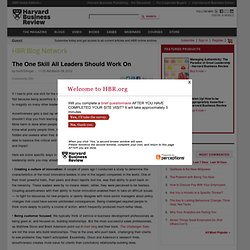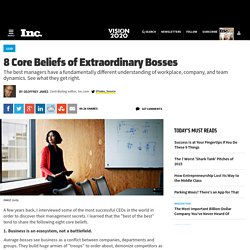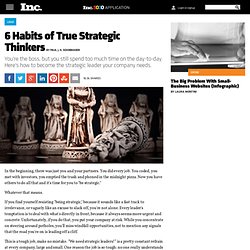

The One Skill All Leaders Should Work On - Scott Edinger. By Scott Edinger | 11:30 AM March 29, 2012 If I had to pick one skill for the majority of leaders I work with to improve, it would be assertiveness.

Not because being assertive is such a wonderful trait in and of itself. Rather, because of its power to magnify so many other leadership strengths. Assertiveness gets a bad rap when people equate it with being pushy and annoying. But that shouldn’t stop you from learning to apply it productively (that is — in service to your strengths).
Here are some specific ways in which assertiveness complements a wide range of the critical leadership skills you may already have: • Creating a culture of innovation: A couple of years ago I conducted a study to determine the characteristics of the most innovative leaders in one of the largest companies in the world. . • Being customer focused: We typically think of service or business development professionals as being good at, and focused on, building relationships. Empathy Is The Most Powerful Leadership Tool. Creative Leadership: Humility and Being Wrong. Strategy: Why Most Companies (and People) Stink At It. What do McKinsey, BCG, and Bain all have in common?

Other than being the employer of choice for hundreds of thousands of CIBs, they are also strategy consulting firms. It’s their focus on strategy that separates them from KPMG (operations and finance), Accenture (IT consulting primarily) and numerous other firms. Given this focus on strategy is such a key differentiator; I’m surprised how infrequently I’m asked just what is strategy? I’ll start by saying most everyone think they know what strategy is (including most MBAs and nearly all of your senior clients). Yet surprisingly, very few companies ACTUALLY have a good strategy. This has always puzzled me. Similarly, I find that few people give much thought to their own personal career strategy — including some MBB consultants! How can there be so much focus on strategy in business school, so much focus on strategy firms in recruiting, and so much focus on strategic plans in corporate, and yet most companies have pretty crappy strategies?
Management Secrets: Core Beliefs of Great Bosses. A few years back, I interviewed some of the most successful CEOs in the world in order to discover their management secrets.

I learned that the "best of the best" tend to share the following eight core beliefs. 1. Business is an ecosystem, not a battlefield. Average bosses see business as a conflict between companies, departments and groups. They build huge armies of "troops" to order about, demonize competitors as "enemies," and treat customers as "territory" to be conquered.
Extraordinary bosses see business as a symbiosis where the most diverse firm is most likely to survive and thrive. 2. Average bosses consider their company to be a machine with employees as cogs. Extraordinary bosses see their company as a collection of individual hopes and dreams, all connected to a higher purpose. 3. Average bosses want employees to do exactly what they're told. 4. The George Costanza Approach to Fixing Fatal Flaws - Scott Edinger.
By Scott Edinger | 11:23 AM October 25, 2011 In my work on leadership development, the first thing I usually advise is to look past your flaws to your strengths, since no one becomes an extraordinary leader by becoming flawless.

You become a great leader, our research shows, by having strengths so profound people forgive, if not completely overlook, your faults. But about 20% of the time, I encounter a person whose flaws are so deep that no strengths can make up for them. I’m not talking about run-of-the-mill, we’re-all-human, flaws. These are fatal, career-ending flaws. This sounds dire — and it is, if unaddressed. It’s so simple, in fact, that we can take a page from my favorite Seinfeld character, George Costanza, a man with hilarious and obvious fatal flaws. This is not quite as far-fetched as it seems. Here are some specific examples of “doing the opposite” for some of the most common fatal flaws I’ve encountered with leaders. These are broad examples, but you get the idea. 6 Habits of True Strategic Thinkers. In the beginning, there was just you and your partners.

You did every job. You coded, you met with investors, you emptied the trash and phoned in the midnight pizza. Now you have others to do all that and it's time for you to "be strategic. " Whatever that means. If you find yourself resisting "being strategic," because it sounds like a fast track to irrelevance, or vaguely like an excuse to slack off, you're not alone. This is a tough job, make no mistake. After two decades of advising organizations large and small, my colleagues and I have formed a clear idea of what's required of you in this role.
Anticipate Most of the focus at most companies is on what’s directly ahead. Look for game-changing information at the periphery of your industrySearch beyond the current boundaries of your businessBuild wide external networks to help you scan the horizon better. What's Your Influencing Style? - Chris Musselwhite and Tammie Plouffe. By Chris Musselwhite and Tammie Plouffe | 2:45 PM January 13, 2012 Effective leadership today relies more than ever on influencing others — impacting their ideas, opinions, and actions.

While influence has always been a valuable managerial skill, today’s highly collaborative organizations make it essential. Consider how often you have to influence people who don’t even report to you in order to accomplish your objectives. Success depends on your ability to effectively influence both your direct reports and the people over whom you have no direct authority.